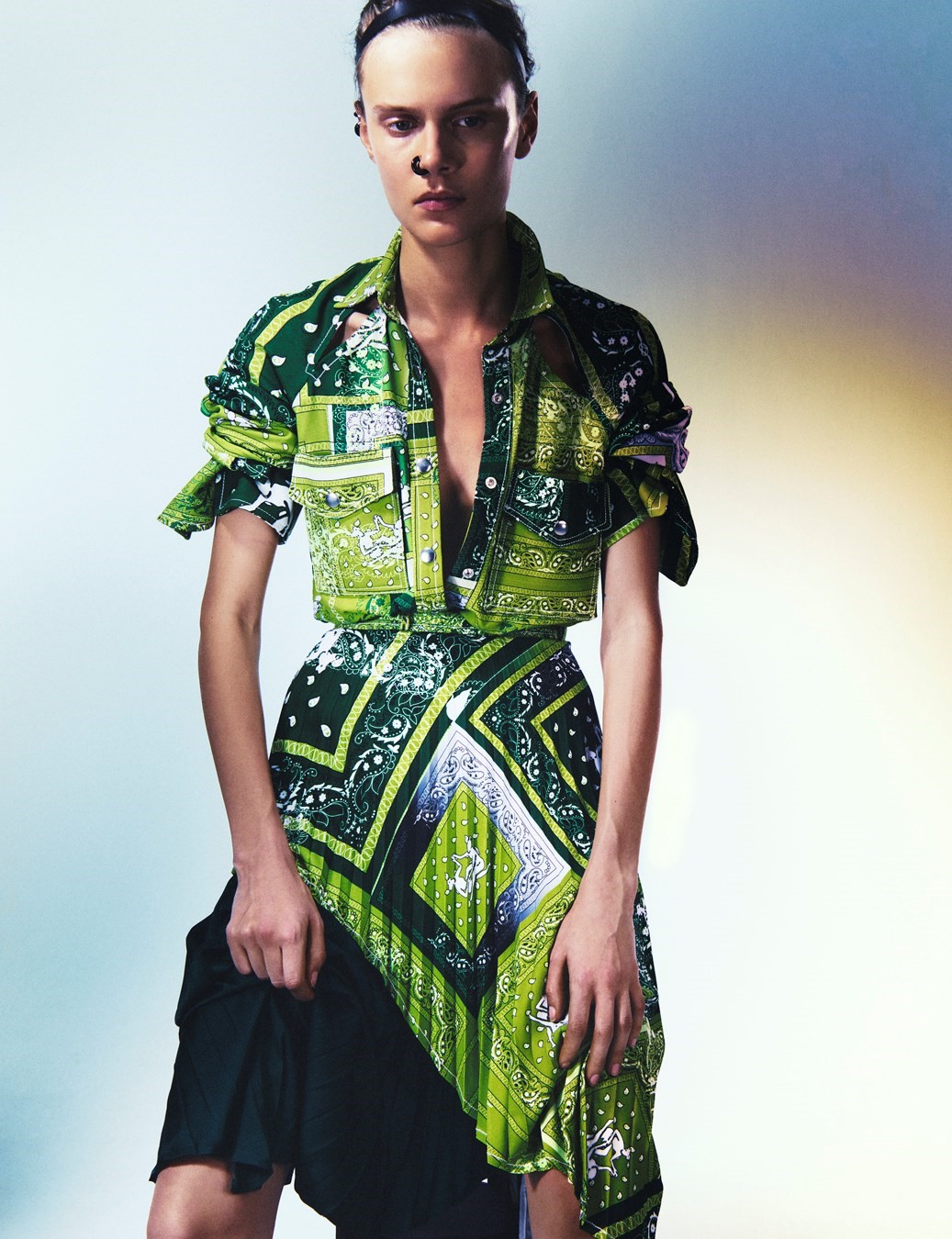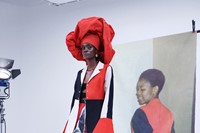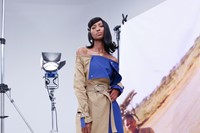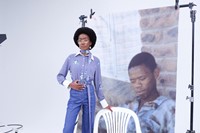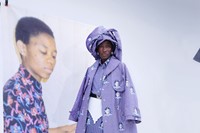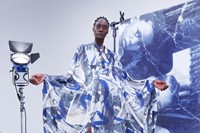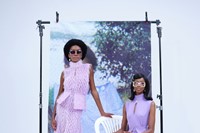This article is taken from the Spring/Summer 2022 issue of AnOther Magazine:
Thebe Magugu was born for fashion – it’s in his name. “A thebe is a black and white African shield with a hardened hide on it,” the 28-year-old designer says over Zoom from his home in Johannesburg. It’s part of an ensemble worn by his ancestors that includes feathered aprons and cowhide armbands – “It’s normally associated with Zulu culture but originates in Botswana,” he adds. His name reflects his work: his own history, identity and experiences are woven into a wider fashion conversation. Sometimes it’s general – his aptitude with colour palettes that run from sun-bleached pastels to blazing neons, his love of wrapped and draped silhouettes, his gestures to the doek headwraps of South Africa. In his Spring/Summer 2021 collection there was a black and white polka-dot print. It looks a bit like old Yves Saint Laurent, but it’s composed of the fingerprints of Olivia Forsyth, a former spy for the apartheid government in the 1980s.
“I want my clothes to be modern relics for the stories of South Africa,” Magugu says. And his home country – where he lives and works – is reflected in every facet of what he creates. Film and photographic collaborations with South African photographer and director Kristin-Lee Moolman and Sierra Leone-born stylist IB Kamara, among others, feature his friends as models, often with his hometown and landscapes familiar to him as backdrop. His studio is based in South Africa and his clothing is manufactured there.
This season, he created his most personal collection yet – titled Genealogy, it was a sartorial family album of sorts. A video presentation, one side of a split screen shows Magugu sitting with his mother Iris and aunt Esther – in his words, “the Rihanna of her time” – looking through a small box of old family photos. On the other side, models present looks inspired by the photos being discussed. “I love this idea of memory as a reservoir for optimism,” Magugu says on camera. Outfits are rediscovered – the suit worn by his mother for her first day at work, the polished look of Magugu’s dandy uncle – and reinvented. “My family had a very strong sense of self and of individualistic fashion,” he says. “The clothes they were wearing in those photos were so modern that I don’t feel I did a lot to change them.” The clothes have the sharp tailoring, vibrant colour and inventive print Magugu is known for. But the overriding message is about the power of clothing as a repository for memory, a medium to evoke emotion. Quietly presented at the Palais de Tokyo during Paris Fashion Week, Genealogy was one of the season’s stand-out collections.
Magugu is originally from Kimberley, a small mining town in the Northern Cape province. He launched his label in 2016, two years after graduating from LISOF in Johannesburg, where he studied fashion design, photography and media. Recognition was swift: he won both the International Fashion Showcase and the LVMH Prize for emerging talent in 2019, becoming the first African designer to receive the latter. Shortly after Genealogy was presented, he was among the 40-plus designers who participated in a tribute show to Alber Elbaz. Magugu’s look was a pleated skirt and blouse in white recycled satin. A throwback to an outfit from Elbaz’s time at Guy Laroche in the late 1990s, it was worn with a huge ostrich-feather hat created with South African milliner Crystal Birch. “Being included in that was so special to me,” Magugu says.
“I come from such a juxtaposed place, both beautiful and ugly, it’s serene and scenic but also very violent and chaotic“ – Thebe Magugu
The designer had dreamt of such moments ever since his first glimpse of the fashion world via satellite TV as a child – the iridescent nurse uniforms of Marc Jacobs’s Louis Vuitton show for Spring/Summer 2008 and the alien forms of Plato’s Atlantis at Alexander McQueen two years later. “Being so far away and looking in, I remember thinking, ‘What is this world and how do I become a part of it?’” he says. “I immediately knew this was what I wanted to do.”
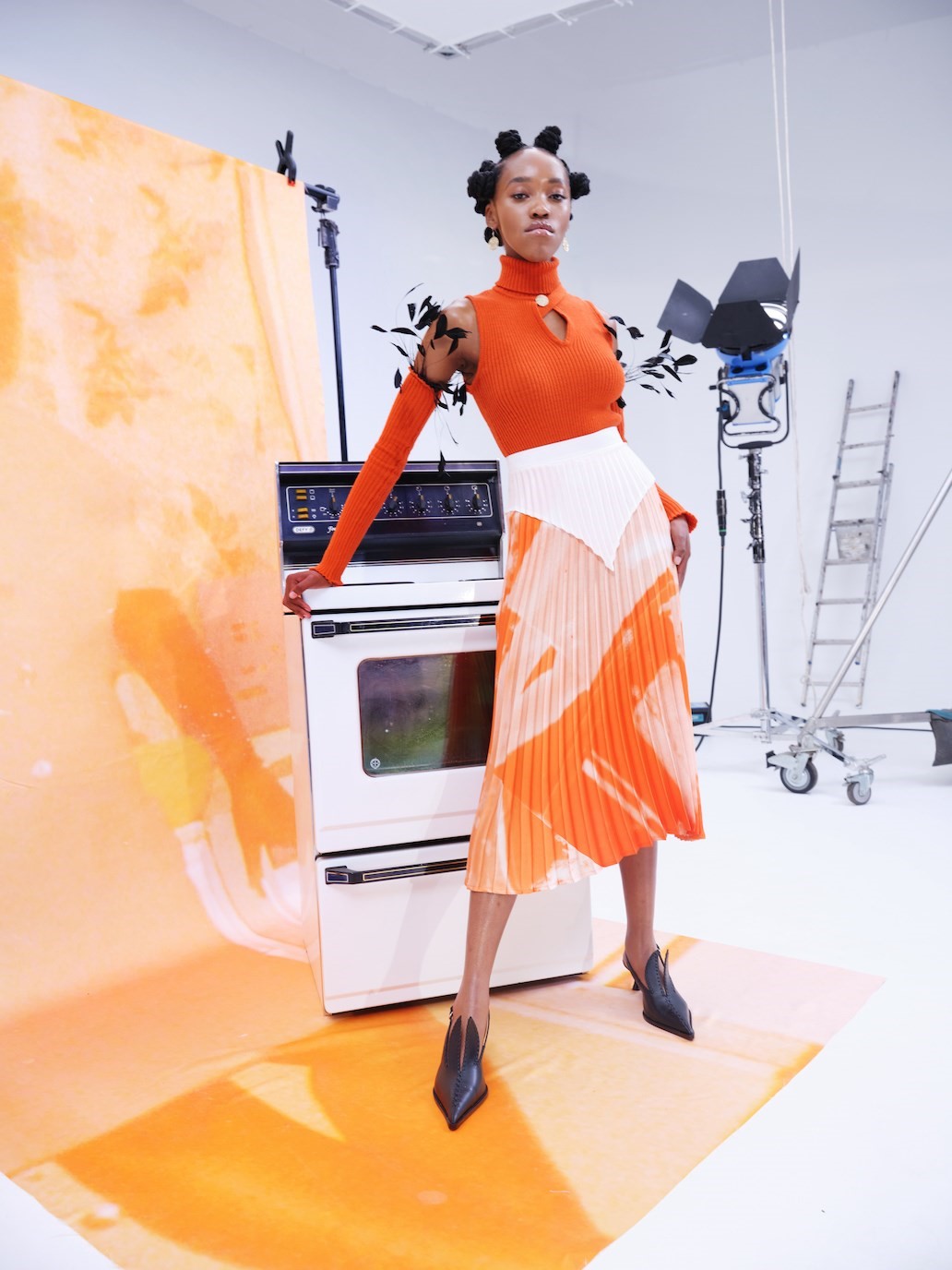
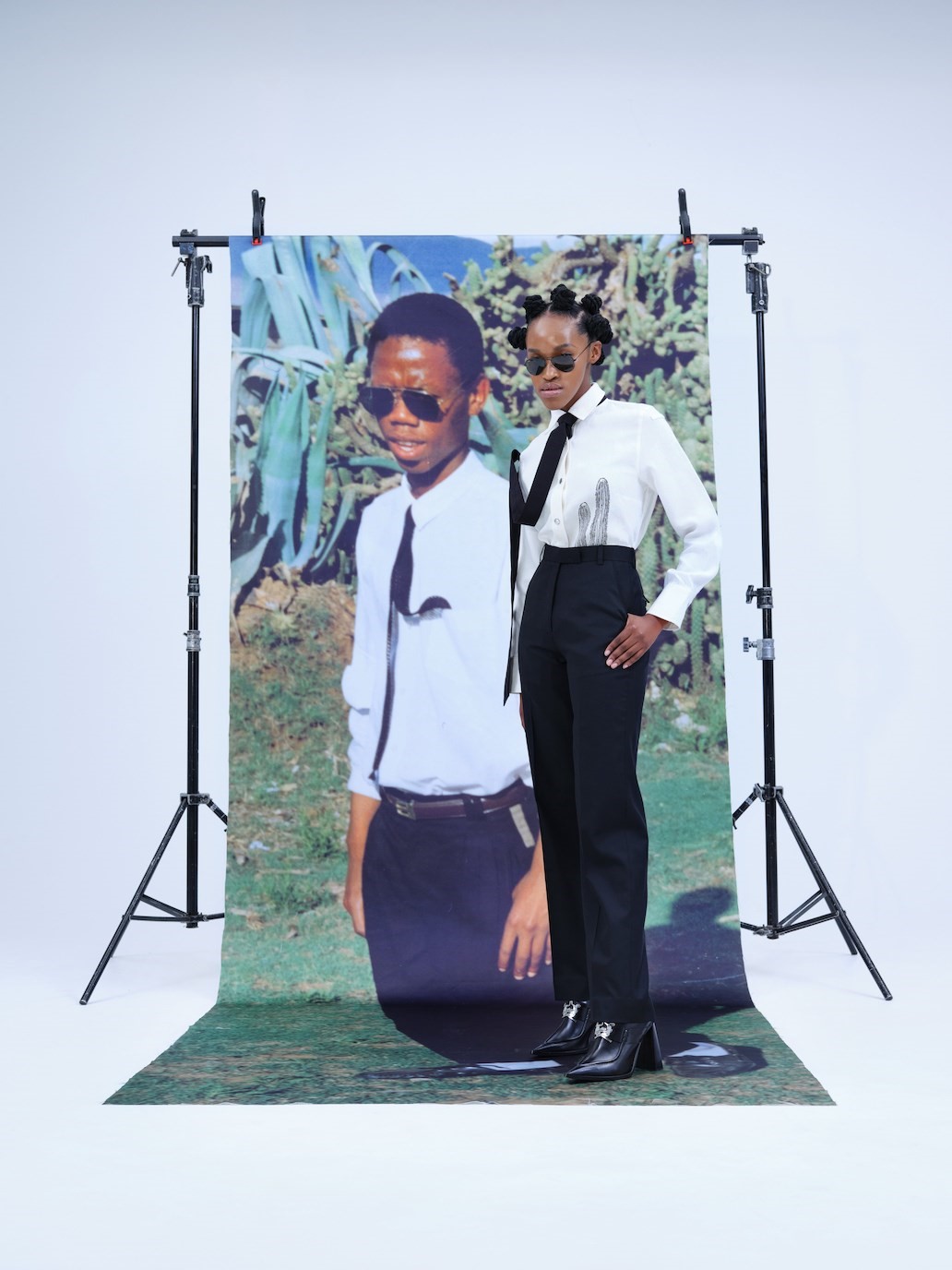
His work is inspired by his upbringing. “We don’t come from much, but my family still had this regality about them,” he says. As an “incredibly sensitive” queer boy, his mother kept a watchful eye over him; kids tormented him with the homophobic slur moffie. “My memories swing from these incredible and fascinating moments to real hurt and confrontation. I come from such a juxtaposed place, both beautiful and ugly, it’s serene and scenic but also very violent and chaotic.” That conflict shows in his clothes. Born shortly after the apartheid regime began to be dismantled, he grew up with the stains of decades of white supremacist leadership and segregation still looming over society. “I’m grateful for having been raised here because those experiences have informed my work. I love it when things that shouldn’t be together come together, when different influences get smashed together to form something new.”
Magugu’s overarching goal is to shift the world’s perception of South African identity. “I want to take the things that have happened in South Africa culturally and historically and translate them into a fashion lexicon so people can see my clothes as modern relics or something encyclopaedic.” While many fashion designers achieve local success before international acclaim, Magugu has experienced the opposite. In 2022, he’s making sure the focus stays on home. “It’s important for me to keep production within the continent, not only in South Africa but other countries like Ethiopia and Botswana, where the cuts and detailing I’m after can be achieved, while also creating jobs. There is something really exciting going on here right now,” he says, smiling. “Homing in on that is on my vision board for the future.”
Hair: Christian Eberhard at Management Artists using ORIBE. Make-up: Christelle Cocquet at Calliste Agency. Models: Tanya Churbanova at Monster Management, Daria Koshkina at Ford Models, Olli Heinimäki at The Sisterhood, Eny Jaki at Oui Management, Mamuor Awak at Elite, Yura Nakano at Bananas and Yuki van Gog at Platform Agency. Casting: Daniel von der Graf and Andrea Prato. Set design: Sophear at Art and Commerce. Manicure: Anais Cordevant at Saint Germain. Digital tech: Lorenzo Touzet. Lighting director: Christian Bragg. Photographic assistant: Jonas Bjurman. Styling assistants: Nicola Neri, Valentine Jaquier and Alyssa Saim. Hair assistant: Giada Marina Giorgio. Make-up assistant: Aya Murai. Manicure assistant: Sueva Foltzer. Set-design assistants: Victor Leverrier and Alexis Mounoury. Production: Town Productions. Production assistants: Melissa Lartigue and Agathe Halin
This article appears in the Spring/Summer 2022 issue of AnOther Magazine, which is on sale here.
